| Srl | Item |
| 1 |
ID:
111538
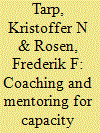

|
|
|
|
|
| Publication |
2012.
|
| Summary/Abstract |
Coaching and mentoring for capacity' is becoming increasingly important in the state-building toolbox. If executed properly, this instrument is believed to be significantly more effective than traditional technical assistance and would consequently seem to hold great promise for the state- and peacebuilding agenda. The latest offshoot of this development is the Initiative for Capacity Enhancement in South Sudan. The initiative seeks to enhance the capacity of the South Sudanese state apparatus by deploying civil servants from neighbouring nations to coach their South Sudanese counterparts. This paper explores this particular initiative with the aim of identifying insights about designing coaching and mentoring programmes for capacity development.
|
|
|
|
|
|
|
|
|
|
|
|
|
|
|
|
| 2 |
ID:
113029
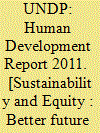

|
|
|
|
|
| Publication |
Hampshire, Palgrave Macmillan, 2011.
|
| Description |
xi, 176p.Pbk
|
| Standard Number |
9780230395084
|
|
|
|
|
|
|
|
|
|
|
|
Copies: C:1/I:0,R:1,Q:0
Circulation
| Accession# | Call# | Current Location | Status | Policy | Location |
| 056617 | 330.5/UND 056617 | Main | On Shelf | Reference books | |
|
|
|
|
| 3 |
ID:
142233
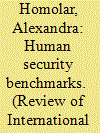

|
|
|
|
|
| Summary/Abstract |
When the United Nations Development Programme formally introduced the concept of human security in 1994, it was widely celebrated as a long-overdue humanist alternative to orthodox models of security. Today, human security is a buzzword for describing the complex challenges that individuals and communities face in achieving safety and wellbeing in an insecure world. This article directs attention away from the emancipatory and empowering qualities commonly ascribed to human security to explore, instead, the specific role of benchmarking within the wider human security agenda. The main focus here is on the ways in which human life has been operationalised, measured, and classified to create indicators that permit judgements about individual security and insecurity. The article argues that although a single global human security benchmark has yet to be established, the main indices used as performance metrics of human insecurity have produced a narrow understanding of what it means to live a ‘secure’ life and have reinforced the state as the main focal point of international security governance.
|
|
|
|
|
|
|
|
|
|
|
|
|
|
|
|
| 4 |
ID:
158980
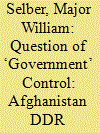

|
|
|
|
|
| Summary/Abstract |
Since the fall of the Taliban in late 2001, the Islamic Republic of Afghanistan (GIRoA), the United States, the United Nations, and the International Security Assistance Force (ISAF) have funded and led three different Disarmament, Demobilization, and Reintegration (DDR) programs. Despite a significant investment in time and treasure, all of them have failed to significantly reduce the number of insurgents or arbaki (militia). This article explores why these programs failed despite incorporating ideas from the prominent DDR schools of thought. Utilizing Stathis Kalyvas’ theory of The Logic of Violence in Civil War as a lens, this article argues that GIRoA and ISAF did not have sufficient control of territory to entice insurgents or arbaki to reconcile and/or reintegrate with the government. Further, in areas GIRoA nominally controlled in northern and western Afghanistan, regional powerbrokers who controlled these areas balked at these programs.
|
|
|
|
|
|
|
|
|
|
|
|
|
|
|
|
| 5 |
ID:
077059
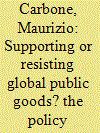

|
|
|